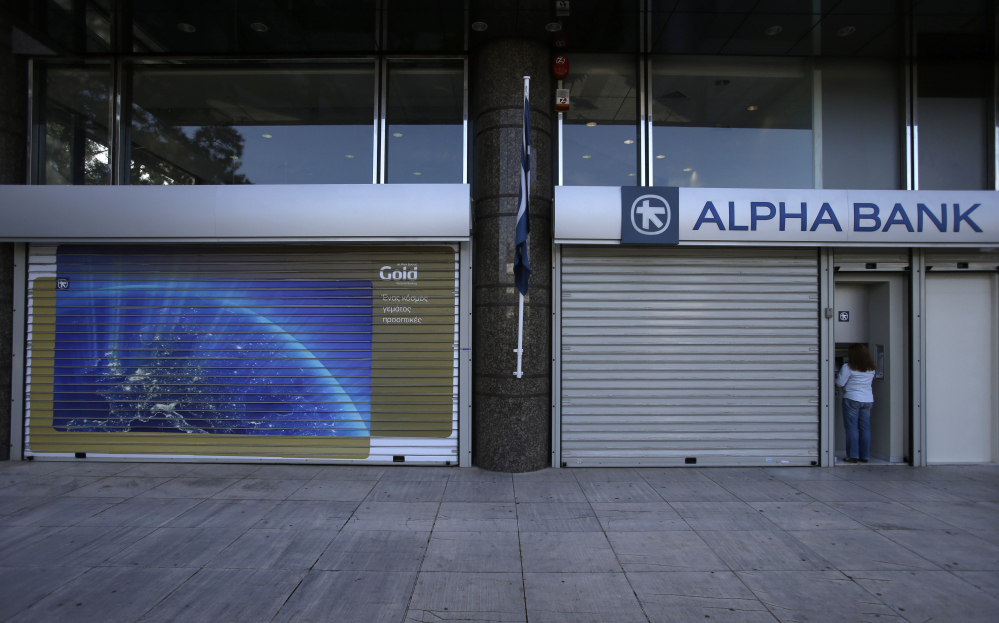NEW YORK – Stocks are closing with their biggest losses of the year as investors worry about fallout from Greece’s worsening debt crisis.
Greece is moving closer to defaulting on its debt and could be forced to abandon the euro currency.
The Dow Jones industrial average dropped 350 points, or 2 percent, to 17,596 Monday.
The Standard & Poor’s 500 index sank 43 points, or 2.1 percent, to 2,057.
The Nasdaq composite tumbled 122 points, or 2.4 percent, to 4,958.
European markets fell even more. Stocks fell 3.6 percent in Germany and 3.7 percent in France.
Bond prices rose sharply as investors sought safety. The yield on the 10-year Treasury note fell to 2.32 percent.
Greece’s long-running debt crisis took a dangerous turn over the weekend after Greece’s Prime Minister, Alexis Tsipras, said his government will hold a referendum on proposals made by the country’s lenders. European officials refused to extend the country’s bailout program, which expires on Tuesday, the same day it’s supposed to make a debt payment to the International Monetary Fund.
The European Central Bank also capped its emergency support for the country’s banks. That prompted the Greek government to close banks and announce limits on withdrawals. Daily cash withdrawals are capped at 60 euros, or $67, per account.
“Whenever you see any kind of bank line, there is in the back of investors’ mind the thought: ‘What if it spreads? What if people panic?’ ” said Karyn Cavanaugh, senior market strategist at Voya Investment Management. “What’s going on in Europe, of course it’s going to roil markets in the short term.” But for U.S. investors, she said, “the long-term impact is not that big of a deal.”
“The initial market reaction is negative,” said Dan Greenhaus, chief strategist at the brokerage BTIG, in a note to clients. But Greenhaus thinks that this episode in the European debt crisis isn’t as dangerous as previous ones. “We do not think this is Armageddon for the global economy,” he said.
The last time Greece’s troubles shook U.S. markets, there were plenty of other problems. In 2012, Spain had entered a recession, and the worry was that it was too big of a country to rescue. Sputtering U.S. job growth added to the anxiety. That spring, the S&P 500 index lost 9.9 percent within two months. Investors sought safety in U.S. Treasury bonds, driving long-term interest to historic lows.
Back then, the fear was that a financial crisis would spread from Greece to the rest of Europe “because these economies were very fragile,” Cavanaugh said. The cost to borrow for 10 years topped 7 percent for Spain and 11 percent for Portugal in 2012. Even with recent turbulence, Spain’s 10-year bond yields 2.32 percent, and Portugal’s 10-year bond yields 2.87 percent.
In other trading on Monday, Sysco said it scrapped a proposed $3.5 billion buyout of US Foods after the Federal Trade Commission blocked the deal to combine the two food-service companies.
The FTC argued that the merger it would reduce competition by putting three-quarters of the U.S. market for restaurant suppliers under the control of one company. Scuttling the deal means Sysco has to pay US Foods $300 million in breakup fees.
Send questions/comments to the editors.



Success. Please wait for the page to reload. If the page does not reload within 5 seconds, please refresh the page.
Enter your email and password to access comments.
Hi, to comment on stories you must . This profile is in addition to your subscription and website login.
Already have a commenting profile? .
Invalid username/password.
Please check your email to confirm and complete your registration.
Only subscribers are eligible to post comments. Please subscribe or login first for digital access. Here’s why.
Use the form below to reset your password. When you've submitted your account email, we will send an email with a reset code.